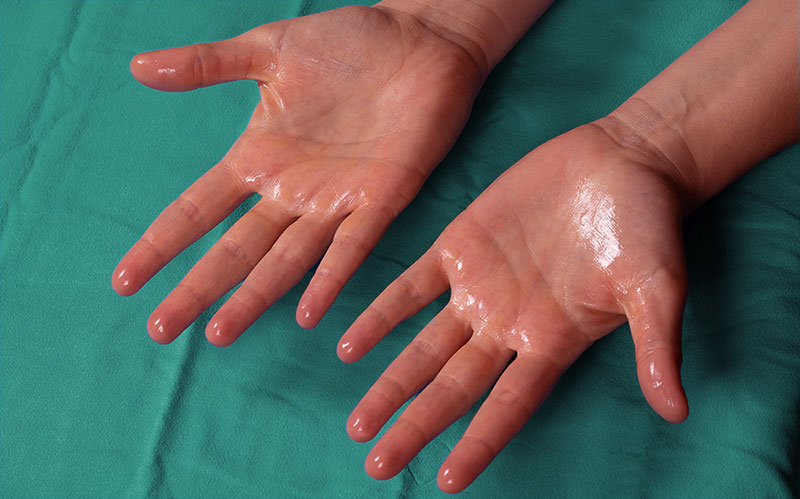Leading Dermatology Treatments for Hyperhydrosis of Hands and Feet: What You Need to Know
Leading Dermatology Treatments for Hyperhydrosis of Hands and Feet: What You Need to Know
Blog Article
Understanding the Source of Excessive Sweating and Its Influence on Day-to-day Live
While it is typically recognized as a physical feedback to manage body temperature, the triggers for extreme sweating can differ widely amongst individuals, incorporating not just physical aspects however additionally emotional and emotional components. By diving into the origin triggers of hyperhidrosis and discovering its complex results, a much deeper understanding of this pervasive problem can be gained, losing light on the intricacies that people grappling with extreme sweating navigate on a daily basis.
Physiology of Sweat Glands
The law of sweat manufacturing, an essential physiological procedure, is mostly controlled by the task of sweat glands dispersed throughout the human body. Sweat glands are classified into 2 main kinds: eccrine and apocrine glands.
When the body temperature level climbs, either because of exercise, high temperature levels, or psychological anxiety, the nerves activates the sweat glands to produce sweat. This sweat is composed mainly of water and electrolytes like salt and chloride. The process of sweat manufacturing is crucial for preserving the body's inner temperature level within a slim, ideal array, highlighting the crucial role gland play in human physiology.
Triggers for Excessive Sweating
In understanding the source of extreme sweating, it is essential to determine the triggers that can lead to this physiological feedback. Too much sweating, also referred to as hyperhidrosis, can be prompted by various factors, both environmental and physiological. One typical trigger is psychological tension or anxiety, which can boost the body's sweat glands to generate more sweat than is needed for cooling. Physical effort, heats, and spicy foods are likewise understood to cause extreme sweating in people prone to this condition. Specific clinical problems like hyperthyroidism, menopause, or diabetes mellitus can contribute to too much sweating as well.
In addition, medicines such as some antidepressants, opioids, and specific supplements can likewise work as triggers for hyperhidrosis. Understanding these triggers is important in managing too much sweating successfully - Treatment for hyperhydrosis of hands. By identifying and attending to the certain triggers that motivate extreme sweating in a private, doctor can establish individualized therapy strategies to alleviate this problem and boost the person's lifestyle
Medical Issue Associated
Connected with extreme sweating are various medical conditions that can exacerbate this physiological feedback. One usual problem is hyperhidrosis, a condition characterized by abnormally increased sweating that surpasses the body's thermoregulatory demands. This can materialize in focal locations like the hands, soles, underarms, or face, impacting an individual's top quality of life because of social embarrassment and discomfort.
Furthermore, endocrine problems such as hyperthyroidism, diabetic issues, and menopausal hot flashes can additionally lead to too much sweating. Hyperthyroidism triggers an overflow of thyroid hormones, accelerating metabolic rate and setting off sweating.
Furthermore, infections like hiv, endocarditis, and consumption have been related to evening sweats, an usual signs and symptom recognized to interfere with rest and impact overall well-being. These clinical conditions highlight the diverse series of underlying aspects that can add to too much sweating, requiring complete examination and administration by health care specialists.
Psychological and emotional Factors

Effect On Social Interactions
Too much sweating can have extensive results on a person's ability to engage comfortably in social interactions. The visible signs of sweat stains or wet patches on clothing can cause shame and self-consciousness, creating individuals to withdraw from social scenarios. This withdrawal can influence relationships, restriction social tasks, and impede individual and expert growth.

In addition, the anxiousness and self-esteem problems stemming from extreme sweating can affect communication and interpersonal abilities. People may have a hard time to focus on discussions, take part in group tasks, or share themselves confidently. This can bring about sensations of isolation and loneliness, as social connections end up being challenging to maintain.
Verdict

While it is generally understood as a physical reaction to manage body temperature, the triggers for extreme sweating can differ widely amongst people, incorporating not only physical aspects yet additionally psychological and psychological aspects. By delving right into the origin creates of hyperhidrosis and discovering its multifaceted effects, a deeper understanding of this pervasive concern can be gotten, dropping light on the complexities that individuals grappling with too much sweating browse on a daily basis.
Physical effort, high temperature levels, and spicy foods are also recognized to cause extreme sweating in people susceptible to this condition. By determining and addressing the specific triggers that motivate extreme sweating in an individual, medical care companies can establish customized therapy plans to relieve this condition and improve the individual's high quality of life.
Too much sweating can have profound results on a person's capacity to involve pleasantly go to my site in social interactions.
Report this page